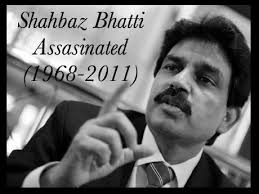BY FARAHNAZ ISPAHANI AND NINA SHEA
Pakistan’s blasphemy law, which turns 30 this year, has become only more deadly with age. Since blasphemy was made a capital crime under the nation’s secular penal code, the effect has been to suppress moderate influences, pushing “Pakistani society further out on the slippery slope of extremism,” said Mujeeb-ur-Rahman, senior advocate at the Supreme Court of Pakistan, in Washington last week. With its large population and sensitive location, Pakistan is a place where any societal shift in the direction of the Taliban deserves the attention of all concerned about Islamic extremism. Instead, this is one more foreign threat that the Obama administration underestimates.

On October 16, for the first time, an appeals court affirmed a death sentence for blasphemy meted out to a woman. A Christian mother of five, Asia Bibi was arrested in 2009 after fellow field hands complained that, during a dispute, she had insulted the prophet of Islam. No evidence was produced, because to repeat blasphemy is blasphemous. Similarly, anyone who defends an accused blasphemer risks being labeled a blasphemer; two officials who made appeals on Bibi’s behalf—Salman Taseer, governor of Punjab, and Shahbaz Bhatti, federal minister for minorities affairs—were assassinated in 2011. Bibi has one last legal recourse, an appeal to the federal Supreme Court, but now no public official dares speak up for her—or for any other blasphemy defendant.


Accusations of blasphemy are brought disproportionately against Pakistan’s Christians, some 2 percent of the population. Intent is not an element of the crime, and recent years have seen cases brought against illiterate, mentally disabled, and teenage Christians. Each case seems to heighten the sensitivities of the extremists and further fracture society. The flimsiest rumor of a Koran burning can spark hysteria ending in riots against entire Christian communities. Lahore’s St. Joseph Colony was torched last year in such a pogrom.
But blasphemy complaints against Muslims are also on the rise. Muslims now make up the largest defendant class; by contrast, during the entire 200 years of the British Raj, not a single blasphemy case against a Muslim is documented, according to the Islamabad Center for Research and Security Studies (CRSS). Particularly hard hit are the Ahmadis, who pride themselves on reconciling Islamic beliefs with modern principles of pluralism, secularism, and peace. In 1974, the constitution was amended to declare the group heretical, and two of the five penal code sections devoted to blasphemy are specific to them. A few months ago, in a not atypical case, an Ahmadi doctor was charged with blasphemy after two Pakistanis posing as patients accused him of “posing as a Muslim” because, at their request, he read from a Koran.
Increasingly, liberal thinkers among Pakistan’s majority Hanafi Muslims are accused of blasphemy. The law’s vagueness—it bans irreverent words about Islam “either spoken or written, or by visible representation, or by any imputation, innuendo, or insinuation, directly or indirectly”—means it can be used against almost anyone, for almost anything. Extremists aggressively manipulate perceptions. Emboldened and even legitimized by the law, some are dispensing with the legal process altogether, acting, often with impunity, as judge and executioner.

The most famous victim of this parody of justice is Malala Yousafzai, one of this year’s Nobel Peace laureates. The media have downplayed the whispering campaign accusing Malala of defaming Islam by challenging the cultural taboo against female education. The accusations have come not only from the Taliban, who shot her but failed to kill her two years ago. Husain Haqqani, former Pakistani ambassador to the United States, pointed out in the Wall Street Journal the Twitter campaign #MalalaDrama, whereby hundreds of young followers of cricket hero Imran Khan have denounced Malala as a “tool of the evil West who is seeking to impose Western values on Islamic Pakistan.” She wisely remains in exile in the United Kingdom, even though Swat, her homeland, has been reclaimed from the Taliban. (Malala is Pakistan’s second Nobel laureate. Its first, Abdus Salam, awarded a Nobel in physics in 1979, was among the earliest Ahmadis driven from Pakistan. He died in exile, but after his remains were buried in Pakistan, a magistrate ordered that words identifying him as Pakistan’s first “Muslim” Nobel laureate be filed off his tombstone.)

Scholar Akbar Ahmed says that “perhaps dozens” of Pakistani reformist educators have faced blasphemy complaints lodged by their students. Junaid Hafeez, professor of English literature at a university in Multan, is currently on trial for his life for blasphemy. He allegedly insulted the prophet on Facebook, though again there is no evidence. Another, Professor Mohammed Younas Shaikh, who started “The Enlightenment” group in Islamabad as a forum for Muslims to discuss their faith in the contemporary context, was accused of blasphemy by a student and sentenced to death, though he managed later to emigrate.

Last month, Professor Shakeel Auj, dean of the Islamic Affairs Department at Karachi University and an acclaimed Koranic scholar, was shot to death by unknown assailants. While well within the Sunni mainstream, Auj espoused a nuanced and sophisticated understanding of Islamic jurisprudence conducive to expanded rights for women. This brought death threats, including from some of his faculty colleagues. His pleas for protection were ignored, and the four professors arrested for threatening him were out on bail when he was killed.
The Supreme Court of Pakistan’s Rahman told us that the lawyers’ association of which he has been a member for 40 years has also grown more extreme under the blasphemy regime. In 2008, the New York Times, reporting on then-president Pervez Musharraf’s threat to judicial independence, exclaimed that Pakistan’s lawyers were evidence that “there truly was a liberal tradition in Pakistan, buried beneath six decades of dictatorship, corruption and religious extremism” and attributed to such lawyers “perhaps the most consequential outpouring of liberal, democratic energy in the Islamic world in recent years.”

Three years later, lawyers in their trademark black suits were seen leading quite a different outpouring. This time its purpose was to cheer Mumtaz Qadri, assassin of Gov. Taseer and one of his security detail, who had said on television, “Salman Taseer is a blasphemer, and this is the punishment for a blasphemer.” Jarring reports showed members of the bar showering the defendant with rose petals as he entered the courthouse for his murder trial. Three hundred pro-bono lawyers signed his defense papers. After rendering a guilty verdict, the judge immediately went into hiding. The BBC entitled its report on the episode “Has Pakistan passed the tipping point of religious extremism?”
In 2000, no less an authority than the Lahore High Court chief justice, Mian Nazir Akhtar, gave a public statement to the effect that “no one had authority to pardon blasphemy and that anyone accused of blasphemy should be killed on the spot, as a religious obligation.” British writer and human rights activist Benedict Rogers commented on the thuggery accompanying the law: “Regularly, mobs of Muslims, often led by Mullahs, crowd into the courtroom, shouting threats at the judge if he does not rule in their favour. Defence lawyers receive death threats for taking on blasphemy cases. Mobs gather outside the courtroom, and physically threaten the lawyers as they leave.”
Some 60 people have been murdered in connection with the blasphemy law, according to CRSS. On September 25, a prison policeman, in cold blood, shot and killed 42-year-old Reverend Zafar Bhatti, president of the Jesus World Mission, accused, without evidence, of blasphemy, and wounded his cellmate, Mohammed Asghar, a 70-year-old diagnosed schizophrenic on death row for blasphemy. Earlier, on May 7, for defending Professor Hafeez, Rashid Rehman, a lawyer of 20 years’ standing, became the fourth person working for Pakistan’s Human Rights Commission to be murdered. Two lawyers were among those who threatened him.
As part of its changing cultural climate, Pakistan has become an “increasingly harsh environment for journalists, particularly those considered liberal,” the BBC reports. The Committee to Protect Journalists cites scores of reporters killed. Media personalities either shot and wounded or threatened with death for blasphemy so far in 2014 include: Shoaib Adil, a publisher in Lahore whose current affairs magazine is considered a rare liberal voice in the Urdu media; Pakistan’s most famous television journalist, Hamid Mir; the country’s most popular television host, Shaista Wahdi; and television anchor and journalist Raza Rumi. The BBC noted that Adil, whose transgression was to publish an Ahmadi judge’s book, is not a Taliban target but “the victim of an everyday witch hunt by Pakistan’s powerful religious groups—the kind of witch hunt that’s so common and yet so scary that it never makes headlines.”
The United States lacks a diplomatic strategy to oppose Pakistan’s blasphemy law. Instead, it actually goes along with the idea of other countries’ criminalizing offensive speech. In 2011, Secretary of State Hillary Clinton, co-chairing a meeting of the Organization of Islamic Cooperation (OIC), initiated the ongoing “Istanbul Process” to curb anti-Islamic blasphemy (also called religious “defamation,” “insult,” and “hate speech”). The administration has even had the United States cosponsor U.N. resolutions with the OIC—resolutions supported, needless to say, by Pakistan—intended to promote stricter global enforcement of hate speech bans.
We need to change course. Education, law, and the media—the backbone of secular civil society—are being dangerously undermined by Pakistan’s blasphemy regime. Raza Rumi, who in March narrowly escaped the assassin’s bullets that killed his driver, wrote, “If politicians, policymakers, judges and lawyers tremble in fear, we may as well surrender our birthright to those who would deny us it. This culture of fear, orchestrated by powerful clerics and frenzied mobs, has paralyzed the criminal justice system. Those enjoying positions of power appear helpless. And there is no counter-narrative to oppose the spread of extremist ideology.”
The United States should make an unapologetic defense of free speech in every appropriate forum and work to roll back this subversive secular law. We should lend moral support to the majority of Pakistanis who are struggling to retain a semblance of a democratic and pluralist society and peace in the region. To the world’s detriment, the administration underestimated the Islamic State. The damage will be all the greater if we continue to ignore the danger from Pakistan’s blasphemy law.
https://www.weeklystandard.com/articles/destroying-pakistan_817078.html?page=3





No comments:
Post a Comment